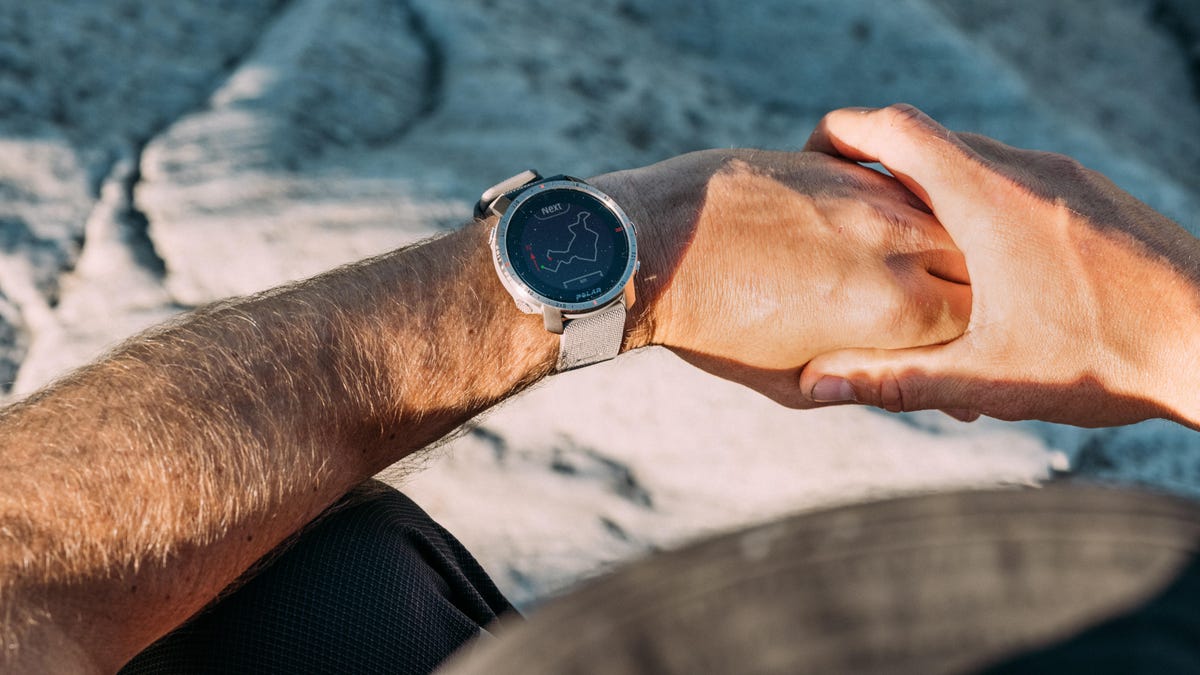Polar’s $500 Grit X Pro Is All About Outdoor Adventure

Polar’s always been a brand for the more hardcore fitness buffs among us. Case in point: When everyone was hunkering down at home last year, the company launched three new fitness smartwatches. Truly inspirational. Now, in 2021, Polar is doubling down on the fact that we’re sick of staying at home by launching yet another premium outdoor GPS watch, the Polar Grit X Pro, as well as updated features for its Vantage V2 and Unite smartwatches.
As the name suggests, the $500 Polar Grit X Pro is a beefier version of last year’s Grit X. It has all the features of the Grit X, including Polar’s famously detailed activity metrics, performance tests, sleep tracking, turn-by-turn navigation, and recovery data. On top of that, it also adds a sapphire glass lens for extra durability and two new dashboards for the always-on display. The first is a location dashboard meant to help people “discover” new areas. It includes info from a barometric-based altimeter, location coordinates, and a compass. The second is a sunrise and sunset dashboard—which is pretty much what it sounds like. There are also new navigation features, including the ability to display route and elevation profiles. However, one thing you’re not getting more of is battery life. The Grit X Pro has the same estimated 40 hours of GPS training as the original Grit X.
The Grit X Pro will come in three colors: Nordic Copper, Black DLC, and Arctic Gold. There’s also a Grit X Pro Titan model. For an extra $100, you get a case made of “ultra-strength, aerospace titanium.” Basically, it’s got a 12% lighter case and also comes with an extra perforated leather band.
These are fairly incremental updates, though expanded always-on display options are always a plus for outdoor endurance sports. A more interesting move is that Polar is bringing Grit X Pro’s outdoor features to the Vantage V2 via software update. Included in the update are the always-on displays with the altimeter, location coordinates, and sunrise/sunset times. It also adds the Grit X’s Track Back feature, which allows users to plan their routes using new profiles. Lastly, it adds the ability for users to use the Vantage V2 as a heart rate sensor on gym equipment or other mobile apps.
G/O Media may get a commission
Design-wise, Polar is releasing a “Shift” edition of the Vantage V2. This is a fancy way of saying you can swap out bands more easily thanks to its new quick-release lugs. It costs a whopping $550—which is $50 more than the regular V2. Existing V2 owners can also buy a $50 “Shift Edition Bundle” which lets them “upgrade” their watches. One might argue the quick-release bars should’ve been a feature of the V2 to begin with, but here we are. There’s also a red version of the V2 because, sure, the more colors the merrier.
Polar is also rolling out two new color options for its Unite smartwatch—teal and red. It’ll also get software updates that let you see a weekly summary, breakdown of energy sources used during a workout, and the ability to use it as a heart rate sensor at the gym.
As for why Polar seems so gung ho on promoting outdoor activity? The official line is that there are “health benefits” to exploring new areas, such as 13% better sleep and lower heart rate averages during running. It’s more likely that this is an area where Polar can stand out in an increasingly crowded wearables market. Apple Watches and the Samsung Galaxy Watch 4 are sleek, highly advanced devices, but they’re inadequate for endurance athletes that need a watch to keep up with them for several hours in areas with a not-so-great signal. But as those flagships get smarter and lock down more casual users, it wouldn’t be surprising for fitness-first brands like Garmin, Suunto, and Polar to triple down on their core niche—triathletes who love studying their data.
Source link





